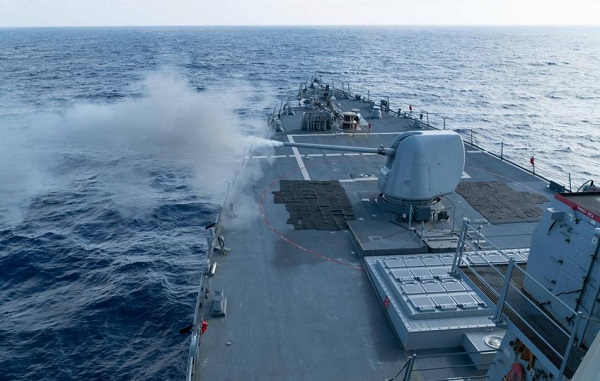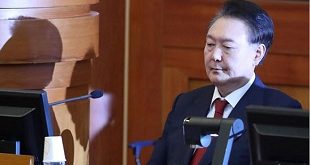
Peking, China | AFP |
An aircraft carrier in the Pacific and a newly upgraded combat aircraft: China’s military is showing off its newest equipment less than a month before the swearing-in of US President-elect Donald Trump, who has raised tensions between Beijing and Taipei.
In recent days state media announced that the country’s only aircraft carrier, the Liaoning, was on its way to the Pacific for the first time, while a new fighter, the FC-31, had its debut flight test.
They are the latest steps in the years-long build-up of China’s military, as Beijing seeks greater global power to match its economic might and asserts itself more aggressively in its own backyard, but the timing raises questions about its intentions.
The show of strength comes after Trump broke four decades of US policy by accepting a phone call from Taiwanese President Tsai Ing-wen, even though China objects to any official contact between its foreign partners and leaders of Taiwan.
China views self-ruling Taiwan as part of its territory awaiting unification, by force if necessary, even though the two sides split in 1949 after a civil war.
With its escort warships, the Liaoning was in the South China Sea on Monday, according to the Taiwanese defence ministry which monitored the carrier’s passage off its shores.
The manoeuvres were preceded by exercises on “refuelling and confrontation in flight”, according to the official news agency Xinhua.
“The threat from our enemy is increasing day by day,” Taiwan’s defence minister Feng Shih-kuan said Tuesday during a promotion ceremony for generals.
“We need to maintain combat vigilance at any time.”
– ‘Signal to Trump’? –
The demonstration of China’s naval capacity comes amid mounting concern on the mainland about the momentum of Taiwan’s independence movement, worries fuelled by Trump’s suggestion that he would consider recognising the self-ruled island as an independent nation.
Nevertheless, it is “impossible to say whether the timing is intended to send a signal to Trump”, said Bonnie Glaser, a China expert at the Washington-based Center for Strategic and International Studies.
“I’m more inclined to see this as an inevitable development and possibly a long planned exercise.”
Beijing has a long way to go before it can claim military superiority over Taiwan’s main protector Washington, which has 10 aircraft carriers in service and a network of naval bases all around the globe, said David Kelly, research director of Beijing-based consulting firm China Policy.
For China, the presence of the Liaoning is above all “symbolic” and aimed at its “domestic audience”, Kelly said.
For now, experts say the People’s Liberation Army Navy would have little hope of countering the smaller but technologically superior US-backed Japan Maritime Self-Defense Force, let alone the US Seventh Fleet.
The second-hand, Soviet-built Liaoning has “almost no strategic significance,” Kelly said. But, he added, “it reminds the US that China can apply pressure on this region”.
In mid-December the Chinese navy announced that the vessel had conducted its first live-fire exercises, including tests with a dozen missiles.
Beijing says the exercises are routine, but state media have expressed pleasure that the Liaoning is battle-ready and that another aircraft carrier, entirely Chinese-made, is under construction.
“Aircraft carriers are strategic tools which should be used to show China’s strength to the world and shape the outside world’s attitude toward China,” said the often nationalist Global Times.
— ‘Intense thinking’ —
Although the US spends far more on its military than China does, Beijing’s growing assertiveness in strategic regions like the South China Sea coupled with the uncertainty surrounding Trump’s policies has set off jitters among Washington’s allies in Asia.
In recent years Beijing has strengthened its claims to the South China Sea and fuelled regional tensions by expanding tiny reefs and islets into artificial islands hosting military facilities.
Brunei, Malaysia, the Philippines, Vietnam and Taiwan have contested Beijing’s claims while Washington has repeatedly called on China to uphold freedom of navigation, sending ships and aircraft to pass close to the new islands.
Beijing is also modernising its air force. The China Daily reported Monday that it recently tested a new prototype stealth fighter, an improved version of the FC-31 Gyrfalcon previously known as the J-31.
Meanwhile, Chinese commentators say Beijing must waste no time in building more aircraft carriers, with the Global Times urging the government “to think about setting up navy supply points in South America right now”.
“The Chinese fleet will cruise to the Eastern Pacific sooner or later,” it said. “When China’s aircraft carrier fleet appears in offshore areas of the US one day, it will trigger intense thinking about maritime rules.”
 The Independent Uganda: You get the Truth we Pay the Price
The Independent Uganda: You get the Truth we Pay the Price



